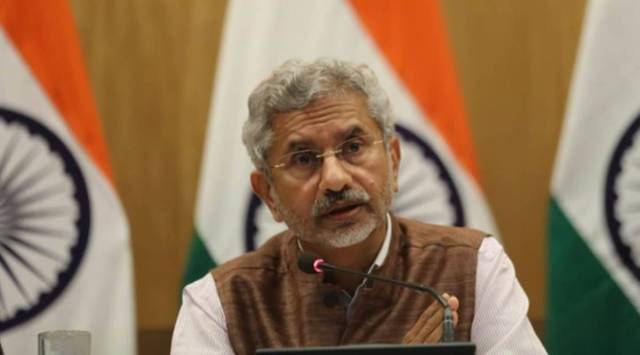Tawang face-off | Our deployment is up to level ‘we have never had’: Jaishankar
“Today we have a deployment of the Indian Army on the China border that we have never had. It is done in order to counter Chinese deployment which was scaled up massively since 2020,” Jaishankar was quoted as saying.
 Takes on Rahul Gandhi in LS: Don’t use the word ‘pitai’ for our jawans.
Takes on Rahul Gandhi in LS: Don’t use the word ‘pitai’ for our jawans. WITH THE government facing Opposition criticism over the face-off between Indian and Chinese troops in Tawang sector of Arunachal Pradesh on December 9, External Affairs Minister S Jaishankar said on Monday that the Indian military will not let China change the status quo along the Line of Actual Control (LAC) “unilaterally”. He said the deployment of Indian troops has been scaled up to a level “we have never had”.
According to a PTI report, Jaishankar, while speaking at India Today’s India-Japan conclave, said: “I am saying that it is the obligation of the Indian state and that is the duty and commitment of the Indian military that we will not let any country, and in this case China, change the LAC unilaterally.”
“Today we have a deployment of the Indian Army on the China border that we have never had. It is done in order to counter Chinese deployment which was scaled up massively since 2020,” Jaishankar was quoted as saying.
Rejecting the Opposition’s criticism, he said: “If we were in denial, then how is the Army out there? The Army did not go there because Rahul Gandhi asked them to go. The Army went there because the Prime Minister of India ordered them to go… the fact is what is finally the proof of the pudding. The proof of the pudding is that the Indian Army is deployed today to counter any attempt to unilaterally change the LAC.”
Later, Jaishankar also took on Rahul in Lok Sabha for saying the Chinese troops were “thrashing our jawans (jawanon ko peet rahe hain)”. “The word ‘pitai’ should not be used for our jawans. They are standing their ground. They should be respected, they should be honoured, and they should be appreciated. This is not something which is appropriate,” he said.
“We should not directly or indirectly criticise the jawans. Our jawans are standing in Yangtse at 13,000 feet and defending our borders. They do not deserve the word ‘pitai’,” he said, while replying to a debate on the Anti-Maritime Piracy Bill, 2019.
Taking on the Opposition for its remarks that the government was indifferent to China, he reiterated: “If we were indifferent to China, who sent the Indian Army to the borders? Why are we today pressing China on disengagement and de-escalation? Why are we saying publicly that our ties are not normal?”
As the Opposition benches protested against his remarks, Jaishankar said: “We have no problem if there are political differences, if there is political criticism. But I think we should not directly or indirectly criticise our jawans.”
Speaking in Jaipur last week, Rahul had accused the government of ignoring the “China threat”. Referring to China, he had said: “Jinhone 2,000 square kilometre Hindustan ka utha liya, jinhone Hindustan ke 20 jawanon ko shaheed kiya, jo humare jawanon ko Arunachal Pradesh mein peet rahe hain (It has taken 2,000 square kilometres of India, martyred 20 Indian jawans, and is thrashing our jawans in Arunachal Pradesh).”
“…China’s threat is clear. The government is trying to hide it, and is ignoring it. But the threat cannot be hidden or ignored,” Rahul had said. “It is a full offensive preparation. The government of India is sleeping. It does not want to hear this, but they (China) are preparing not for an incursion, but for war,” he had said.
Rahul had also criticised Jaishankar, saying he keeps making remarks but needs to “deepen his understanding”. Hitting back, Jaishankar said: “I have heard that my own understanding needs to be deepened. When I see who is giving the advice I can only bow and respect.”
Jaishankar also disapproved of the Congress’s criticism of the government’s celebrations over India’s G20 presidency. “This is a moment when the world is looking for Indian leadership. When the world values India’s leadership. Just because something is rotational does not mean you are not valued,” he said.
Participating in the debate, Congress leader Adhir Ranjan Chowdhury said India’s presidency of the G20 was being “propagated in a manner to glamourise an individual and a government”. “I don’t know the significance of this kind of propaganda because… as a system of rotation we have been entrusted to host G20,” Chowdhury said.
Meanwhile, Opposition parties in Rajya Sabha walked out on Monday after the Chair rejected their demand for a debate on China’s incursions.
Raising the China issue later, former Finance Minister P Chidambaram asked the government whether Prime Minister Narendra Modi and China’s President Xi Jinping had discussed the border situation when they met at the G20 Summit in Bali.
Citing an additional Rs 500 crore sought for border roads in supplementary demand for grants, Chidambaram said: “These are strategic and border roads in the Northeast,” he said. “We know who is the threat in the northern and eastern border. Has China conceded anything on Hot Springs? Have the Chinese agreed to discuss the friction points in the Doklam Junction and the Depsang Plains?”
Amid the Opposition’s demand for a discussion on the Tawang scuffle, Defence Minister Rajnath Singh had made a suo motu statement in both Houses of Parliament last week. “PLA troops tried to transgress the LAC in the Yangtse area of Tawang sector and unilaterally change the status quo”, he had said, adding that there were “injuries to a few personnel on both sides”.
He had said the “Indian Army bravely prevented the PLA from transgressing into our territory and compelled them to return to their posts” and the “issue has also been taken up with the Chinese side through diplomatic channels”.
Meanwhile, Congress president Mallikarjun Kharge said in Alwar on Monday that the Opposition wanted a discussion on the border situation, but the BJP government was not ready for it. “They (BJP-led government) talk like a lion outside, but their actions, if you see, are like a mouse. We want that the issue be discussed… but they are still not ready for a discussion in Parliament,” he said.
– With PTI







